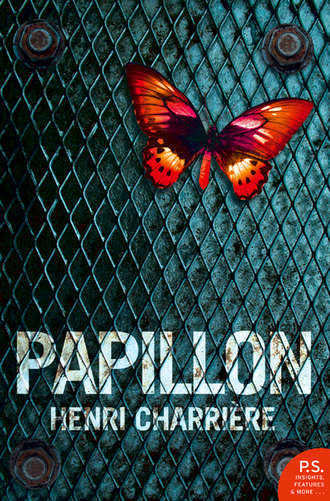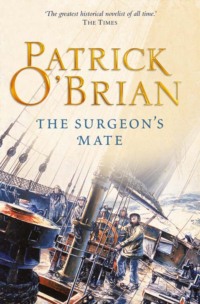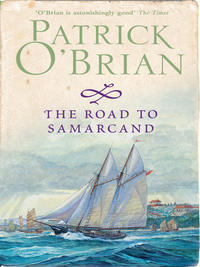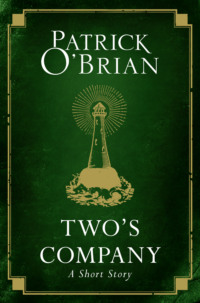
Полная версия
Papillon
Julot was very white and his eyes were swollen: he certainly had a temperature. His arm had been broken three days ago, and he must have been in shocking pain. Quietly he said, ‘My arm’s broken.’
‘You asked for it. That’ll teach you to fly at people. You’ll see the doctor when he comes. I hope it will be within a week. The waiting will be good for you, because the pain will perhaps be a lesson. But you don’t think I’m going to send for a doctor especially for a fellow like you? You can just wait until the prison doctor has time to come, and he will look after you. But nevertheless I sentence you both to the black-hole until further orders.’
Julot looked full at me, right in the eye. He seemed to be saying, ‘This well-dressed gent disposes of other people’s lives very easily.’
I turned towards the governor again and looked at him. He thought I meant to speak. He said, ‘And what about you? The sentence doesn’t seem to be to your liking? Have you anything to say against it?’
I said, ‘Absolutely nothing, Monsieur le Directeur. The only thing I feel is an urge to spit in your eye; but I don’t like to do so, in case it should dirty my spit.’
He was taken aback, he reddened and for a moment he couldn’t grasp what I’d said. But the chief warder grasped it all right. He roared at the screws, ‘Take him out and look after him properly. I want to see him here again in an hour’s time, begging pardon on his hands and knees. We’ll tame him! I’ll make him polish my boots with his tongue, soles and all. Don’t be lenient with him – he’s all yours.’
Two warders twisted my right arm, two others my left. I was flat on my face with my hands right up against my shoulder-blades. They put on handcuffs with a thumb-piece, fixing my left forefinger to the thumb of my right hand, and the top warder picked me up by the hair like an animal.
There’s no point telling you what they did to me. I’ll just say I had the handcuffs on behind my back for eleven days. I owed my life to Batton. Every day he tossed the regulation hunk of bread into my cell, but since I couldn’t use my hands it was impossible to eat it. Even when I had it wedged up against the bars I couldn’t manage to bite into the lump. But Batton also tossed in bits the size of a mouthful, and he tossed in enough to keep me alive. I heaped them up with my foot and flat on my belly I ate them like a dog. I chewed each bit very thoroughly, so as not to lose anything at all.
When they took the handcuffs off me on the twelfth day the steel had eaten in, and in some places the metal was covered with bruised flesh. The head warder got scared, particularly as I fainted away with the pain. After they had brought me round they took me to the hospital, where they cleaned me up with hydrogen peroxide. The attendant insisted on my being given an anti-tetanus shot. My arms had stiffened and could not go back to their natural position. It took more than half an hour of rubbing them with camphorated oil before I could bring them down to my sides.
I went back to the black-hole, and the chief warder, seeing the eleven hunks of bread, said, ‘You can have a proper banquet now! But it’s funny – you haven’t got all that thin after eleven days of starving.’
‘I drank plenty of water, chief.’
‘Ah, so that’s it. I get you. Well, now eat plenty to get your strength back.’ And he went away.
The poor bloody half-wit! He said that because he was sure I hadn’t eaten anything for eleven days and because if I stuffed myself all at once I should die of it. Not bleeding likely. Towards nightfall Batton sent me in some tobacco and cigarette-paper. I smoked and smoked, breathing out into the central-heating pipe – it never worked, of course, but at least it served that purpose.
Later I called up Julot. He too thought I had eaten nothing for eleven days and he advised me to go easy. I did not like to let him know the truth, because I was afraid of some bastard picking up the message. His arm was in plaster; he was in good form; he congratulated me on holding out. According to him the convoy was close at hand. The medical orderly had told him the shots the convicts were to be given before they left had already arrived. They usually came a month before the convoy left. Julot wasn’t very cautious, for he also asked me whether I had managed to keep my charger.
Yes, I had kept it all right, but I can’t describe what I had had to do not to lose it. There were some cruel wounds in my anus.
Three weeks later they took us out of the punishment cells. What was up? They gave us a marvellous shower with soap and hot water. I felt myself coming to life again. Julot was laughing like a child and Pierrot le Fou beamed all over himself with happiness.
Since we had come straight out of the black-hole we knew nothing about what was happening. The barber wouldn’t answer when I whispered, ‘What’s up?’ A wicked-looking character I didn’t know said, ‘I think we’re amnestied from the punishment cells. Maybe they’re scared of an inspector who’s coming by. The great thing is they have to show us alive.’ Each of us was taken to an ordinary cell. At noon, as I ate my first bowl of hot soup for forty-three days, I found a bit of wood. On it I read ‘Leave in a week’s time. Shots tomorrow.’
Who had sent it? I never knew. It must have been some convict who was decent enough to give us warning. He knew that if one of us knew it we all should. It was just chance that the message came to me. I called Julot right away and told him. ‘Pass it on,’ I said.
I heard telephoning all night long. As for me, once I’d sent it out I stopped. I was too comfortable in my bed. I didn’t want any sort of trouble. And the prospect of going back to the black-hole didn’t attract me at all. Today less than any other time.
1 10,000 francs
2 The branch of the police particularly concerned with crime.
3 The executioner in 1932.
4 1 lb. of bread and one-and-three-quarter pints of water.
Second Exercise-Book On the way to Guiana
Saint-Martin-de-Ré
That evening Batton sent me in three cigarettes and a piece of paper that read, ‘Papillon, I know you’ll remember me kindly when you go. I’m provost, but I try to hurt the prisoners as little as possible. I took the job because I’ve got nine children and I can’t wait for a pardon. I’m going to try to earn it without doing too much harm. Good-bye. Good luck. The convoy is for the day after tomorrow.’
And in fact the next day they assembled us in the corridor of the punishment-block in groups of thirty. Medical orderlies from Caen gave us shots against tropical diseases. Three shots for each man, and three and a half pints of milk. Dega was close to me: he looked thoughtful. We no longer paid any attention to the rules of silence for we knew they couldn’t put us in the punishment cell just after having our injections. We gossiped in an undertone right there in front of the screws, who dared not say anything because of the orderlies from the town.
Dega said to me, ‘Are they going to have enough cellular vans to take us all in one go?’
‘I don’t think so.’
‘It’s a good way off. Saint-Martin-de-Ré, and if they take sixty a day, it’ll last ten days, because we’re close on six hundred here alone.’
‘The great thing is to have the injections. That means you’re on the list and soon you’ll be in Guiana. Keep your chin up, Dega: the next stage is beginning now. Count on me, just as I count on you.’
He looked at me, his eyes shining with pleasure; he put his hand on my arm and once again he said, ‘Life or death, Papi.’
There was nothing really much to say about the convoy, except that each man very nearly stifled in his little cupboard in the cellular van. The warders wouldn’t let us have any air, not even by letting the doors stand just ajar. When we reached La Rochelle two of the people in our van were found dead, asphyxiated.
There were people standing around on the quay – for Saint-Martin-de-Re is an island and we had to take a boat to cross – and they saw those two poor unfortunate bastards being found. Not that they showed feelings of any sort for us, I may add. And since the gendarmes had to hand us over at the citadel, living or dead, they loaded the corpses on to the boat along with the rest of us.
It was not a long crossing, but it gave us a real breath of sea-air. I said to Dega, ‘It smells of a break.’ He smiled. And Julot, next to us, said, ‘Yes. It smells of a break. I’m on my way back to the place I escaped from five years ago. Like a silly bastard I let myself be picked up just as I was on the point of carving up the fence who’d done the Judas on me at the time of my little trouble ten years ago. Let’s try and stay together, because at Saint-Martin they put you ten to a cell in any old order, just as you come to hand.’
He’d got that one wrong, brother Julot. When we got there he and two others were called out and set apart from the rest. They were three men who had got away from the penal settlement: they had been retaken in France and now they were going back for the second time.
Grouped ten by ten in our cells, we began a life of waiting. We were allowed to talk and smoke, and we were very well fed. The only danger during this period was for your charger. You could never tell why, but suddenly you would be called up, stripped and very carefully searched. The whole of your body first, even the soles of your feet, and then all your clothes. ‘Get dressed again!’ And back you went to where you came from.
Cells: dining-hall: the courtyard where we spent hours and hours marching in single file. ‘Left, right! Left, right! Left, right!’ We marched in groups of five hundred convicts. A long, long crocodile; wooden shoes going clack-clack. Compulsory total silence. Then, ‘Fall out!’ Everyone would sit down on the ground, forming groups according to class or status. First came the men of the genuine underworld: with them it scarcely mattered where you came from, and there were Corsicans, men from Marseilles, Toulouse, Brittany, Paris and so on. There was even one from the Ardèche, and that was me. I must say this for the Ardèche – there were only two Ardèchois in the whole convoy of one thousand nine hundred men, a gamekeeper who had killed his wife, and me. Which proves that the Ardéchois are good guys. The other groups came together more or less anyhow, because more flats than sharps go to the penal settlements, more squares than wide boys. These days of waiting were called observation days. And it was true enough they observed us from every possible angle.
One afternoon I was sitting in the sun when a man came up to me. A little man, spectacled, thin. I tried to place him, but with our clothing all being the same it was very difficult.
‘You’re the one they call Papillon?’ He had a very strong Corsican accent.
‘That’s right. What do you want with me?’
‘Come to the latrine,’ he said. And he went off.
‘That guy,’ said Dega, ‘he’s some square from Corsica. A mountain bandit, for sure. What can he possibly want with you?’
‘I’m going to find out.’
I went towards the latrines in the middle of the courtyard and when I got there I pretended to piss. The man stood next to me, in the same attitude. Without looking round he said, ‘I’m Pascal Matra’s brother-in-law. In the visiting-room he told me to come to you if I needed help – to come in his name.’
‘Yes: Pascal’s a friend of mine. What do you want?’
‘I can’t keep my charger in any more. I’ve got dysentery. I don’t know who to trust and I’m afraid it’ll be stolen or the screws will find it. Please, Papillon, please carry it for me a few days.’ And he showed me a charger much bigger than mine. I was afraid he was setting a trap – asking me to find out whether I was carrying one myself. If I said I was not sure I could hold two, he’d know. Without any expression I said, ‘How much has it got in it?’
‘Twenty-five thousand francs.’
Without another word I took the charger – it was very clean, too – and there in front of him I shoved it up, wondering whether a man could hold two. I had no idea. I stood up, buttoned my trousers … it was all right. It did not worry me.
‘My name’s Ignace Galgani,’ he said, before going. ‘Thanks, Papillon.’
I went back to Dega and privately I told him about what had happened.
‘It’s not too heavy?’
‘No.’
‘Let’s forget it then.’
We tried to get in touch with men who were being sent back after having made a break: Julot or Guittou, if possible. We were eager for information – what it was like over there, how you were treated, how you ought to set about things so as to be left paired with a friend, and so on. As luck would have it we chanced upon a very odd guy, a case entirely on his own. He was a Corsican who had been born in the penal settlement. His father had been a warder there, living with his mother on the Isles du Salut. He had been born on the Ile Royale, one of the three – the others are Saint-Joseph and Devil’s Island. And (irony of fate!) he was on his way back, not as a warder’s son but as a convict.
He had copped twelve years for housebreaking. Nineteen: frank expression and open face. Both Dega and I saw at once that he had been sold down the river. He only had a vague notion of the underworld; but he would be useful to us because he could let us know about what was in store. He told us all about life on the islands, where he had lived for fourteen years. For example, he told us that his nurse on the islands had been a convict, a famous tough guy who had been sent down after a knife-fight in Montmartre, a duel for the love of the beautiful Casque d’Or. He gave us some very valuable advice – you had to make your break on the mainland, because on the islands it was no go at all: then again you mustn’t be listed dangerous, because with that against your name you would scarcely step ashore at Saint-Laurent-du-Maroni before they shut you right away – interned you for a certain number of years or for life, according to how bad your label was. Generally speaking, less than five per cent of the convicts were interned on the islands. The others stayed on the mainland. The islands were healthy, but (as Dega had already told me) the mainland was a right mess that gradually ate the heart out of you with all sorts of diseases, death in various shapes, murder, etc.
Dega and I hoped not to be interned on the islands. But there was a hell of a feeling there in my throat – what if I had been labelled dangerous? What with my lifer, the business with Tribouillard and that other one with the governor, I’d be lucky to get away with it.
One day a rumour ran through the prison – don’t go to the sick-bay whatever happens, because everybody who is too weak or too ill to stand the voyage is poisoned. It was certainly all balls. And indeed a Parisian, Francis la Passe, told us there was nothing in it. There had been a type who died of poison there, but Francis’ own brother, who worked in the sick-bay, explained just what had happened.
The guy had killed himself. He was one of the top safebreaking specialists, and it seems that during the war he had burgled the German embassy in Geneva or Lausanne for the French Intelligence. He had taken some very important papers and had given them to the French agents. The police had brought him out of prison, where he was doing five years, specially for this job. And ever since 1920 he had lived quietly, just operating once or twice a year. Every time he was picked up he brought out his little piece of blackmail and the Intelligence people hurriedly stepped in. But this time it hadn’t worked. He’d got twenty years and he was to go off with us. So as to miss the boat he had pretended to be sick and had gone into hospital. According to Francis la Passe’s brother a tablet of cyanide had put paid to his capers. Safe deposits and the Intelligence Service could sleep in peace.
The courtyard was full of stories, some true, some false. We listened to them in either case – it passed the time.
Whenever I went to the latrines, either in the courtyard or in the cell, Dega had to go with me, on account of the chargers. He stood in front of me while I was at it and shielded me from over-inquisitive eyes. A charger is a bleeding nuisance at any time, but I had two of the things still, for Galgani was getting sicker and sicker. And there was a mystery about the whole affair: the charger I shoved up last always came out last, and the first always first. I’ve no idea how they turned about in my guts, but that’s how it was.
At the barber’s yesterday someone had a go at murdering Clousiot while he was being shaved. Two knife-stabs right next to his heart. By some miracle he didn’t die. I heard about the whole thing from a friend of his. It was an odd story and I’ll tell it one day. The attack was by way of settling accounts. The man who nearly got him died six years after this at Cayenne, having eaten bichromate of potassium in his lentils. He died in frightful agony. The attendant who helped the doctor at the post-mortem brought us five inches of gut. It had seventeen holes in it. Two months later this man’s murderer was found strangled in his hospital bed. We never knew who by.
It was twelve days now that we had been at Saint-Martin-de-Ré. The fortress was crammed to overflowing. Sentries patrolled on the ramparts night and day.
A fight broke out between two brothers, in the showers. They fought like wild-cats and one of them was put into our cell. André Baillard was his name. He couldn’t be punished, he told me, because it was the authorities’ fault: the screws had been ordered not to let the brothers meet on any account whatsoever. When you knew their story, you could see why.
André had murdered an old woman with some money, and his brother Emile hid the proceeds. Emile was shopped for theft and got three years. One day, when he was in the punishment cell with some other men, he let the whole thing out: he was mad with his brother for not sending him in money for cigarettes and he told them everything – he’d get Andre, he said; and he explained how it was André who had done the old woman in and how it was he, Emile, who had hidden the money. What’s more, he said, when he got out he wouldn’t give André a sou. A prisoner hurried off to tell the governor what he had heard. Things moved fast. André was arrested and the two brothers were sentenced to death. In death alley at the Santé their condemned cells were next door to one another. Each put in for a reprieve. Emile’s was granted the forty-third day, but André’s was turned down. Yet out of consideration for André’s feelings Emile was kept in the condemned cell and the two brothers did their daily exercise together, the one behind the other, with chains on their legs.
On the forty-sixth day at half-past four in the morning André’s door opened. They were all there, the governor, the registrar and the prosecuting counsel who had asked for his head. This was the execution. But just as the governor stepped forward to speak André’s lawyer appeared, running, followed by someone else who handed the prosecutor a paper. Everyone went back into the corridor. André’s throat was so tight and stiff he couldn’t swallow his spit. This wasn’t possible – executions were never interrupted once they had begun. And yet this one was. Not until the next day, after hours of dreadful doubt, did he hear from his lawyer that just before his execution President Doumer had been murdered by Gorguloff. But Doumer hadn’t died right away. The lawyer had stood there all night outside the hospital, having told the Minister of Justice that if the President died before the time of the execution (between half-past four and five in the morning) he would call for a postponement on the grounds that there was no head of state. Doumer died at two minutes past four. Just time to warn the ministry, jump into a cab, followed by the man with the order for putting it off; but he got there three minutes too late to stop them opening André’s door. The two brothers’ sentences were commuted to transportation and hard labour for life: for on the day of the new president’s election the lawyer went to Versailles, and as soon as Albert Lebrun was chosen, the lawyer handed him the petition for a reprieve. No president ever refuses the first reprieve he is asked for. ‘Lebrun signed,’ said Andre, ‘and here I am, mate, alive and well, on my way to Guiana.’ I looked at this character who had escaped the guillotine and I said to myself that in spite of all I had gone through it was nothing to what he must have suffered.
Yet I never made friends with him. The idea of his killing a poor old woman to rob her made me feel sick. This André was always a very lucky man. He murdered his brother on the Ile Saint-Joseph some time later. Several convicts saw him. Emile was fishing, standing there on a rock and thinking about nothing but his rod. The noise of the heavy waves drowned every other sound. André crept up on his brother from behind with a thick ten-foot bamboo in his hand and shoved him off his balance with a single push. The place was stiff with sharks and precious soon Emile had become their lunch. He wasn’t there at the evening roll-call and he was put down as having disappeared during an attempt to escape. No one talked about him any more. Only four or five convicts gathering coconuts high up on the island had seen what happened. Everyone knew, of course, except for the screws. André Baillard never heard another word about it.
He was let out of internment for ‘good conduct’ and he had a privileged status at Saint-Laurent-du-Maroni. They gave him a little cell to himself. He had a disagreement with another convict and one day he treacherously asked him into this cell: there he killed him with a stab right to the heart. They wore his plea of self-defence and he was acquitted. Then, when the penal settlement was abolished, he was pardoned, still on account of his ‘good conduct’.
Saint-Martin-de-Ré was stuffed with prisoners. Two quite different sorts: eight hundred or a thousand real convicts and nine relégués – men in preventive detention. To be a convict you have to have done something serious or at least to have been accused of an important crime. The mildest sentence is seven years hard labour and then it goes up by stages to life, or perpetuity, as they say. A commuted death-sentence automatically means perpetuity. Preventive detention, or relegation, that’s something quite different. If he’s sentenced from three to seven times, a man can be relegated. It’s true they’re all incorrigible thieves and you can see that society has to protect itself. But still it’s shameful that a civilized nation should have this extra sentence of preventive detention. They are small-time thieves – clumsy operators, since they are shopped so often – who get relegation (and in my time that meant the same as life) and who have never stolen as much as ten thousand francs in their whole career as thieves. That’s the greatest bit of meaningless balls French civilization has to offer. A nation has no right to revenge itself nor to wipe out the people who hinder the workings of society. They are people who ought to be treated rather than be punished in such an inhuman way.
Now we had been seventeen days at Saint-Martin-de-Ré. We knew the name of the ship that was to carry us to the settlement: she was the Martinière. She was going to take one thousand eight hundred and seventy prisoners aboard. That morning eight or nine hundred convicts were assembled in the inner court of the fortress. We had been standing there for about an hour, lined up in ranks of ten, filling the square. A gate opened and in came men who were not dressed like the warders we were used to. They wore good, military kind of clothes: sky-blue. It wasn’t the same as a gendarme and it wasn’t the same as a soldier. They each had a broad belt with a holster; the revolver grip showed. There were about eighty of them. Some had stripes. They were all sunburnt and they were of any age between thirty-five and fifty. The old ones looked pleasanter than the young, who threw a chest and looked important – gave themselves airs. Along with these men’s officers there came the governor of Saint-Martin-de-Ré, a gendarmerie colonel, three or four quacks in overseas army uniform and two priests in white cassocks. The gendarmerie colonel picked up a speaking-trumpet and put it to his mouth. We expected shun! but nothing of the kind. He said, ‘Listen carefully, all of you. From this moment on you are taken over by the authorities of the Ministry of Justice, representing the penitentiary administration of French Guiana, whose administrative centre is the town of Cayenne. Major Barrot, I hereby hand over to you the eight hundred and sixteen convicts now present, and this is the list of their names. Be so good as to check that they are all here.’









